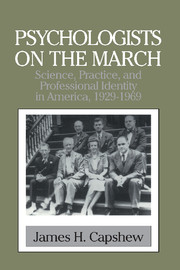Book contents
- Frontmatter
- Contents
- Acknowledgments
- List of Abbreviations
- Introduction: The Psychologists' War
- Interlude I
- 1 Growing Pains: After the Great War
- 2 Mobilizing for World War II: From National Defense to Professional Unity
- 3 Home Fires: Female Psychologists and the Politics of Gender
- Interlude II
- 4 Sorting Soldiers: Psychology as Personnel Management
- 5 Applied Human Relations: The Utility of Social Psychology
- 6 From the Margins: Making the Clinical Connection
- 7 Engineering Behavior: Applied Experimental Psychology
- Interlude III
- 8 A New Order: Postwar Support for Psychology
- 9 Remodeling the Academic Home
- Interlude IV
- 10 The Mirror of Practice: Toward a Reflexive Science
- 11 Beyond the Laboratory: Giving Psychology Away
- Interlude V
- Epilogue: Science in Search of Self
- Index
11 - Beyond the Laboratory: Giving Psychology Away
Published online by Cambridge University Press: 06 July 2010
- Frontmatter
- Contents
- Acknowledgments
- List of Abbreviations
- Introduction: The Psychologists' War
- Interlude I
- 1 Growing Pains: After the Great War
- 2 Mobilizing for World War II: From National Defense to Professional Unity
- 3 Home Fires: Female Psychologists and the Politics of Gender
- Interlude II
- 4 Sorting Soldiers: Psychology as Personnel Management
- 5 Applied Human Relations: The Utility of Social Psychology
- 6 From the Margins: Making the Clinical Connection
- 7 Engineering Behavior: Applied Experimental Psychology
- Interlude III
- 8 A New Order: Postwar Support for Psychology
- 9 Remodeling the Academic Home
- Interlude IV
- 10 The Mirror of Practice: Toward a Reflexive Science
- 11 Beyond the Laboratory: Giving Psychology Away
- Interlude V
- Epilogue: Science in Search of Self
- Index
Summary
Although the voices of professional psychologists became more numerous and audible in postwar America, they hardly constituted a monopoly on discussions about psychology and modern life. Other experts on human behavior, such as sociologists, psychiatrists, and anthropologists, offered their views to an eager public, as did various critics and commentators. The extent and variety of discourse on “the psychological society” seemed to indicate that psychology had moved to the forefront of public consciousness.
The notion that Americans lived in a “psychological society” took hold rapidly in the 1950s and had become a commonplace by the 1960s. Contemporary awareness of the changing social environment was stimulated by works that plumbed the meaning of modern life. Many commentators, both inside and outside academe, framed their analysis in terms of the relations between personality and culture. Among the first studies to appear after the war was David Riesman's evocatively titled book The Lonely Crowd (1950), which explored the personality characteristics of people living in a mass society, particularly the shift in the location of people's moral compass from within themselves (“inner-directedness”) to outside agents (“other-directedness”). His concern over the decline of individualism was shared by William H. Whyte, Jr., a writer for Fortune magazine. In The Organization Man (1956), he traced the rise of a set of values that privileged collective belonging, whether to a corporation, research enterprise, or other group.
- Type
- Chapter
- Information
- Psychologists on the MarchScience, Practice, and Professional Identity in America, 1929–1969, pp. 241 - 258Publisher: Cambridge University PressPrint publication year: 1999

